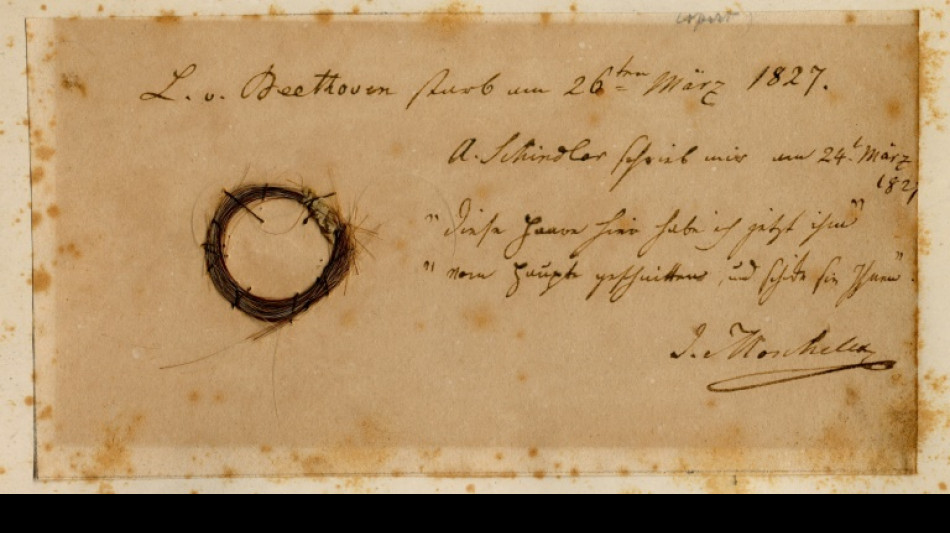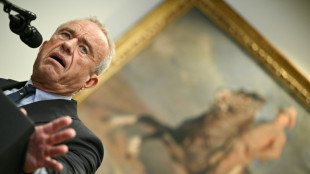
-
 AI-created Iran protest videos gain traction
AI-created Iran protest videos gain traction
-
Five things to know about Uganda

-
 Uganda votes under internet blackout and police crackdown
Uganda votes under internet blackout and police crackdown
-
Dreams on hold for Rohingya children in Bangladesh camps

-
 Canada's Carney in Beijing for trade talks with Chinese leaders
Canada's Carney in Beijing for trade talks with Chinese leaders
-
All Blacks fire coach Robertson less than two years before World Cup

-
 Long-awaited EU-Mercosur trade pact set for signing
Long-awaited EU-Mercosur trade pact set for signing
-
Trump embraces AI deepfakes in political messaging

-
 A year of Trump: US health policy reshaped in RFK Jr's image
A year of Trump: US health policy reshaped in RFK Jr's image
-
One year in, Trump shattering global order

-
 Hit TV show 'Heated Rivalry' a welcome surprise for gay hockey community
Hit TV show 'Heated Rivalry' a welcome surprise for gay hockey community
-
Spanish singer Julio Iglesias prepares defence against abuse allegations: Hola! magazine

-
 Actor McConaughey seeks to patent image to protect from AI
Actor McConaughey seeks to patent image to protect from AI
-
Musk's Grok barred from undressing images after global backlash

-
 Hosts Morocco set up Senegal AFCON final showdown
Hosts Morocco set up Senegal AFCON final showdown
-
Trump says Iran killings stopped, Tehran says 'no plan for hanging'

-
 Chelsea paid for costly errors in Arsenal defeat, says Rosenior
Chelsea paid for costly errors in Arsenal defeat, says Rosenior
-
Morocco beat Nigeria on penalties to reach Africa Cup of Nations final

-
 Golden Globes viewership shrinks again
Golden Globes viewership shrinks again
-
Astronauts leave ISS in first-ever medical evacuation

-
 NASA reports record heat but omits reference to climate change
NASA reports record heat but omits reference to climate change
-
Trump praises 'terrific' new Venezuela leader after call

-
 Real Madrid crash out of Copa del Rey at Albacete on Arbeloa debut
Real Madrid crash out of Copa del Rey at Albacete on Arbeloa debut
-
Trump says Iran killings stopped as US scales back Qatar base

-
 Arsenal beat Rosenior's Chelsea in League Cup semi first leg
Arsenal beat Rosenior's Chelsea in League Cup semi first leg
-
US stocks fall again as Iran worries lift oil prices

-
 Inter extend Serie A lead to six points after Napoli slip
Inter extend Serie A lead to six points after Napoli slip
-
Bayern beat Cologne to move 11 points clear in Bundesliga

-
 Mane takes Senegal past Egypt into final of his last AFCON
Mane takes Senegal past Egypt into final of his last AFCON
-
Trump says Greenland will 'work out' after Denmark fails to bridge gap

-
 'Bridgerton' premieres in Paris promising 'Cinderella with a twist'
'Bridgerton' premieres in Paris promising 'Cinderella with a twist'
-
California begins probe of Musk's Grok over sexualized AI images

-
 Astronauts set to leave ISS in first-ever medical evacuation
Astronauts set to leave ISS in first-ever medical evacuation
-
Napoli's stalemate with Parma opens door for Serie A leaders Inter

-
 Syrian leader urges Kurdish integration as army sends troops east of Aleppo
Syrian leader urges Kurdish integration as army sends troops east of Aleppo
-
Denmark says White House talks failed to alter US designs on Greenland

-
 Venezuela looking to 'new era' after Maduro ouster, says interim leader
Venezuela looking to 'new era' after Maduro ouster, says interim leader
-
Mane takes dominant Senegal past Egypt into AFCON final

-
 UK police admit 'mistakes' over Maccabi Tel Aviv fan ban
UK police admit 'mistakes' over Maccabi Tel Aviv fan ban
-
Promoter says Joshua will return to ring when 'time is right' after horror crash

-
 California investigating Grok AI over lewd fake images
California investigating Grok AI over lewd fake images
-
Wales's Faletau set to miss bulk of Six Nations

-
 Denmark, Greenland wrap up crunch White House talks
Denmark, Greenland wrap up crunch White House talks
-
England sweating on Fin Smith's fitness for Six Nations opener

-
 NASA acknowledges record heat but avoids referencing climate change
NASA acknowledges record heat but avoids referencing climate change
-
England rugby league coach Wane quits role

-
 Oil prices extend gains on Iran worries
Oil prices extend gains on Iran worries
-
European basketball pioneer Schrempf lauds 'global' NBA

-
 Denmark, Greenland in crunch White House talks as Trump ups pressure
Denmark, Greenland in crunch White House talks as Trump ups pressure
-
Mitchell hits ton as New Zealand down India to level ODI series


DNA analysis of Beethoven's hair provides clues to his death
Ludwig van Beethoven died in Vienna nearly 200 years ago after a lifetime of composing some of the most influential works in classical music.
Ever since, biographers have sought to explain the causes of the German composer's death at the age of 56, his progressive hearing loss and his well-documented struggles with chronic illness.
A team of researchers who sequenced Beethoven's genome using locks of the German composer's hair may now have some answers.
Liver failure, or cirrhosis, was the likely cause of Beethoven's death brought about by a number of factors, including his alcohol consumption, they said.
"We looked at possible genetic causes of his three main symptom complexes -- the progressive hearing loss, the gastrointestinal symptoms and the liver disease ultimately leading to his death due to liver failure," said Markus Nothen of the Institute of Human Genetics at the University Hospital of Bonn, one of the co-authors.
Beethoven, Nothen said, had "a strong genetic disposition to liver disease" and sequences of the hepatitis B virus were detected in his hair.
"We believe the disease arose from an interplay of genetic disposition, well documented chronic alcohol consumption and hepatitis B infection," Nothen said.
Johannes Krause of the Max Planck Institute for Evolutionary Anthropology said hepatitis B "was probably quite common at that time in the early 19th century."
"At least in the last few months before his death he was infected with hepatitis B virus," Krause said.
The authors of the study, published in the Cell Press journal Current Biology on Wednesday, were unable to determine the cause of the hearing loss that eventually left Beethoven profoundly deaf.
The researchers analyzed eight locks of hair said to be from Beethoven and determined that five of them were "almost certainly authentic," said Tristan Begg, a PhD student at the University of Cambridge and the lead author of the study.
"Because we reconstructed the genome from ultra-short DNA fragments, we only confidently mapped about two-thirds of it," he said.
- 'Acute illness' -
Beethoven, who was born in Bonn in 1770 and died in 1827, battled gastrointestinal problems at various times of his life as well as jaundice.
"There were periods of acute illness where he was unable to work, for example, his month-long period of acute illness in the spring of 1825," Begg said.
The researchers, by studying Beethoven's DNA data and archival documents, also uncovered a discrepancy in his legal and biological genealogy.
They found an "extra-pair paternity event" -- a child resulting from an extramarital relationship -- in Beethoven's direct paternal line, said Toomas Kivisild of the Institute of Genomics at the University of Tartu.
Kivisild said it occurred some time within seven generations that separate a common ancestor, Aert van Beethoven, at the end of the 16th century and Beethoven's birth in 1770.
Begg said it was no surprise it was not recorded.
"You wouldn't necessarily expect an extra-pair paternity event to be documented," he said, being "probably clandestine in nature."
"You cannot rule out that Beethoven himself may have been illegitimate," Begg said.
"I'm not advocating that," he stressed. "I'm simply saying that's a possibility and you have to consider it."
Beethoven had asked in an 1802 letter that his health problems, particularly his hearing loss, be described after his death.
"He had the wish to be studied post-mortem," Krause said.
"And it is kind of, basically, his wish that we are fulfilling to some degree with this project."
X.Habash--SF-PST

